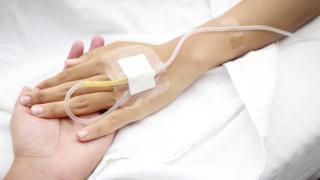 Image copyright
Image copyright
Getty
An independent review is to be carried out into chemotherapy given to 14 women who died after NHS Tayside gave lower doses than other Scottish health boards.
The health board requested the review after it was criticised in a report by Health Improvement Scotland (HIS).
It will be carried out by Dr David Dunlop, senior medical officer for cancer with the Scottish Government.
NHS Tayside said dosages were lowered to reduce side-effects.
It added that the risks to the 304 breast cancer patients involved were very small and it will now bring treatment into line with the rest of the country.
A further expert group, led by Prof Aileen Keel of the Scottish Cancer Taskforce, is to “fully consider all of the report’s individual recommendations and how they can be best delivered”.
The group’s findings are expecting to be presented in June.
A spokesman for NHS Tayside said, “As part of our response to the HIS report which was published on Monday, NHS Tayside asked an independent expert to review the breast cancer chemotherapy treatment of 14 patients who have died.
“These patients received breast cancer chemotherapy during the time period 1 December 2016 until 31 March 2019.
“The findings will be shared with the families.”
‘Not well tolerated’
HIS were called in after a whistleblower raised concerns over chemotherapy treatment in NHS Tayside.
The watchdog found that from December 2016 onwards, the dosage of docetaxel given to breast cancer patients was lower than in any other Scottish health board area.
It also found that patients were not told their treatment was different.
According to the report, the health board perceived that the higher dosage “is not well tolerated” by its patient population.
An NHS Tayside audit found “unacceptable rates of neutropenic sepsis”, a life-threatening complication of cancer treatment, the report said.
HIS recommended the health board keep patients informed where “routine practice is different from that supported by the wider oncology community”.
Patients who are affected are being offered an appointment with an oncologist to discuss their treatment.
A spokesman for Healthcare Improvement Scotland said: “The report makes a number of recommendations to support the future management of breast cancer in North of Scotland Cancer Network (NOSCAN) and NHS Tayside.”
Chemotherapy doses review after 14 NHS Tayside patients die

